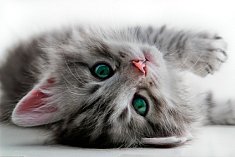|
Interpreting Cat Sounds

Cats can produce hundreds of variations of cat sounds, but most fall into one of five categories: meow, hiss, yowl, growl or purr. Each vocalization conveys a different message, but all are attempts to get a message across. The more time you spend with your cat, the more you will understand their individual sounds and know how to respond to them. Cat sounds differ in pitch, volume and duration.
Meowing
Meowing is the most recognized sound that both kittens and adult cats make. Kittens start meowing at just two days old, as a way of communicating with their mother. Adult cats do not meow to each other as a means of communication, but instead save that as way of telling their owners that they are either in need of food or attention. Some cats are more vocal than others, but typically most cats make several variations of meows, whether it's a cheery, whiny or persistent cat sound, you'll start to pick up on what your cat's meow means. Respond to meowing by ensuring that all of your cat's needs are met. Your cat may be meowing because he or she is hunger, wants the litter to be changed in the litter box, wants to be petted or just wants to play.
Hissing
Hissing is seen as a form of communication with a very negative connotation – with good reason. Cats hiss when they are either upset or afraid. Cats sometimes hiss when they simply want to be left alone and their personal space is being invaded, it’s their way of saying, go away or leave me alone. Hissing should be seen as a warning that your cat is upset and needs a bit of time to calm down. Cats sometimes hiss when you’re trying to get them to do something that they don’t want to do, for example; when we used to try to brush our youngest cat’s teeth, we use the dental gel instead now, she would hiss when she saw the tooth brush and toothpaste, it was simply her way of telling us that this is not something she enjoys and she will not be co-operating. Hissing should be interpreted as, “back off, or else!” Sometimes, cats will hiss at a new cat you've introduced to the family. Cats are territorial and like to let others know that everything belongs to them, especially a new cat. This hissing is normal and may continue until the two cats become better acquainted and get used to each other. It doesn't usually require any human intervention unless fighting gets out of hand. Sometimes hissing may indicate that your cat is in pain, if your cat consistently hisses when you try to gently pet or touch him/her, you should take your cat to the vets for a check up.
Yowling
Yowling is a loud, throaty cat sound that raises and lowers in pitch. It is a cat sound that your cat might make for several different reasons. Your cat may yowl if they are upset, in pain, or even hungry. A cat in heat will howl to let potential mating partners know that they are ready to mate, after your cat is spayed or neutered this type of howling will stop. Cats are intelligent creatures and realize that their owners are alarmed by their yowl and therefore react promptly to it. For this reason, some cats may yowl just to get your attention. It may seem obvious, but you may also want to check to make sure your cat has enough food and clean water if they are yowling. If there has been a recent change in their food or litter, such as a special diet for weight loss or a less dusty litter, they may yowl in hopes that you will give them the food or litter they are used to, cats hate change. Our youngest cat howls if after coming home from work, my husband goes out, either to take out the garbage or run some errands, she stands at the door and yowls, it’s her way of expressing that she wants him to just stay in once he gets home. It’s important to keep in mind that your cat persistent yowling may be because they are in pain, if the howling continues even after giving your cat attention and making sure they have fresh food and water, it’s time to take your cat for a check-up at the vets.
Growling
Growling is a low cat sound that isn't heard as often. Cats growl when they are angry, feel threatened, or unhappy. This cat sound should also be interpreted as a warning, and your cat should be given some space. If your cat growls at you, leave them alone. If they're growling at something else, try and remove the item or animal. Cats can growl when an attack is imminent. You want to check on your cat when they make this noise to ensure they are safe. They may bite or use their claws while growling. If you have multiple cats, you may want to be especially careful when you hear growling, because they may be preparing for a cat fight. One of our cats growls a little when she is getting her nails clipped, it’s her way of letting us know just how much she hates getting it done.
Purring
Purring is a cat sound felines make to communicate to their owners that they are comfortable, relaxed and happy. It feels wonderful to come home after a long day at work and have your cat/cats jump up on the couch beside you and begin to purr as your rub the top of their heads. Mother cats also purr to their kittens, who are born deaf and blind, as a way of letting their kittens know where they are so that they can find her nipples to nurse. Strangely though, cats also purr when they are ill, tense or in pain. A loud purr means they want attention. Some scientists believe that purring may be a natural pain reliever for cats and releases endorphins. They also think that since a purr is usually between 25 and 150 Hertz, it promotes healing and bone growth.
Cats love to hear their owners voice, a calm reassuring tone helps to keep your cat calm during stressful times and help to build a strong bond between you and your feline friend. Through their different vocalization our cats are trying to teach us how to best care for them.
Similar Topics
Common Cat Behavior Problems - Discussing Common Cat Behavior Problems And How To Deal With Them.
Cats Fighting: Causes And How To Prevent It - Cats fight for several different reasons, here we discuss the reasons and how to prevent cats fighting in your home.
Return From Cat Sounds To Cat Health Home Page
|
Protect Your Pet Card
In Case Of An Emergency The Protect Your Pet Card Lets Emergency Services Know That You Have Pet/Pets Waiting For You At Home, Making Sure That Your Pets Are Cared For.
Get Your Card Today!
Win A Free $250 Petsmart Gift Card For Your Cat!
Must Be A US Resident
Click Here To Easily Enter For Your Chance To Win.

"There are few things in life more heartwarming than to be welcomed by a cat."






